Nursing Philosophy: Meta-Paradigms, Theories, and Ethical Practice
VerifiedAdded on 2023/04/20
|11
|2996
|355
Essay
AI Summary
This essay delves into the core of nursing philosophy, examining key concepts such as the nursing meta-paradigm (person, health, environment, and nursing itself) and the ongoing debate between nursing as a science versus an art. It emphasizes the importance of ethical principles like humanity, dignity, autonomy, and accountability in nursing practice, highlighting the need for therapeutic relationships built on effective communication. The essay also touches upon the significance of professional boundaries, particularly concerning patient confidentiality, and references nursing theories like Orem's Self-Care Deficit Theory and Leininger's Culture Care Theory, advocating for culturally competent and patient-centered care. The author shares a personal experience to illustrate the application of these principles in real-world scenarios, underscoring the holistic approach necessary for successful patient treatment and positive health outcomes. Desklib provides similar solved assignments and study tools for students.
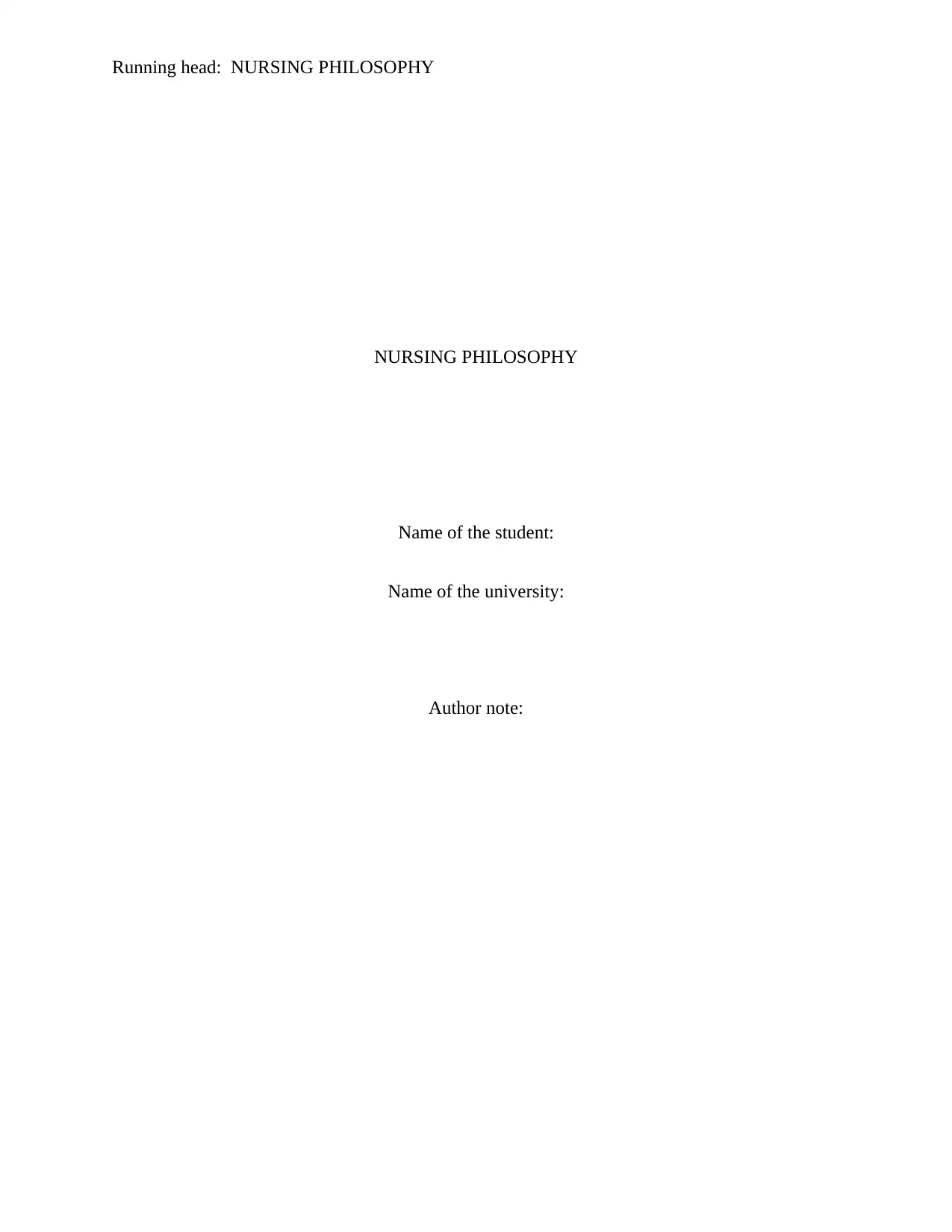
Running head: NURSING PHILOSOPHY
NURSING PHILOSOPHY
Name of the student:
Name of the university:
Author note:
NURSING PHILOSOPHY
Name of the student:
Name of the university:
Author note:
Paraphrase This Document
Need a fresh take? Get an instant paraphrase of this document with our AI Paraphraser
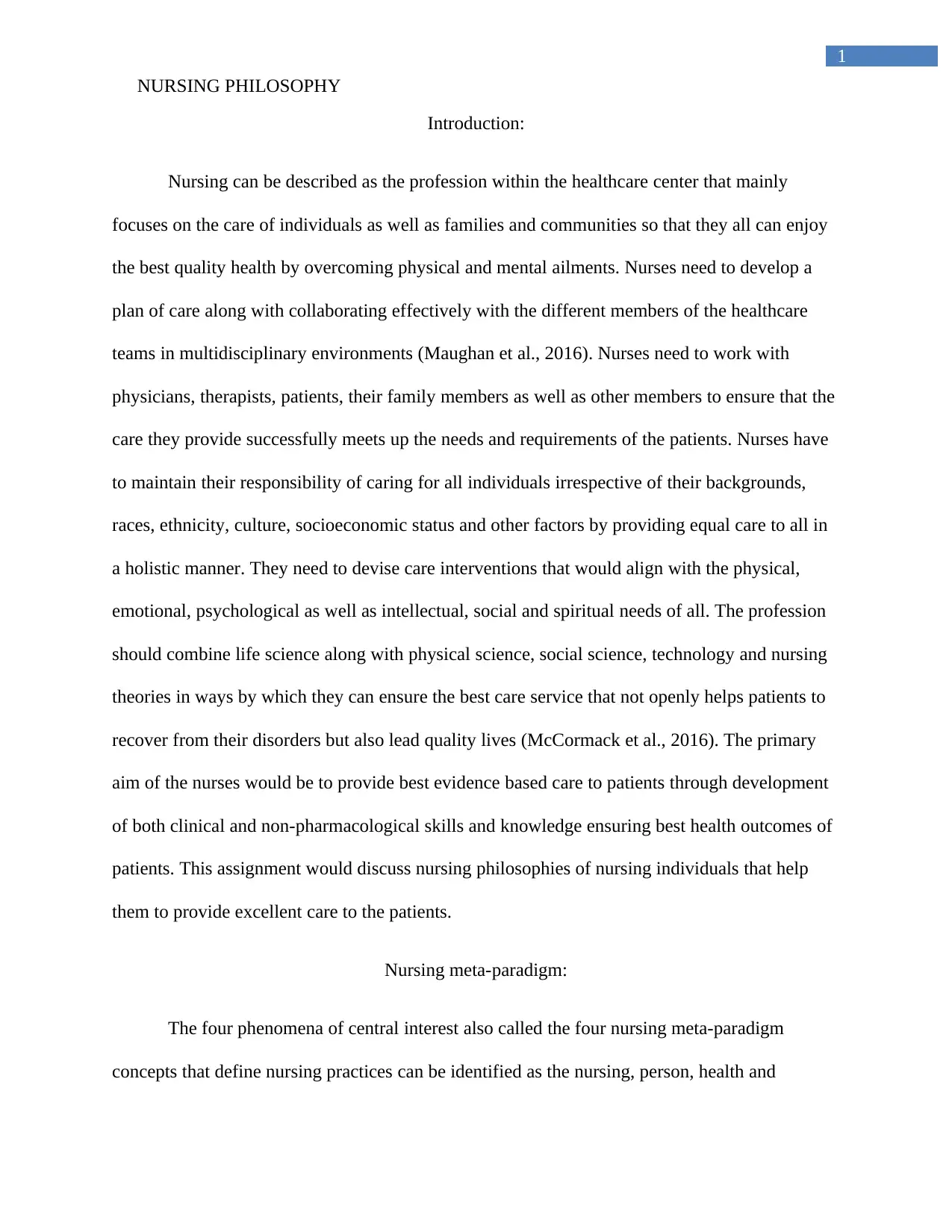
1
NURSING PHILOSOPHY
Introduction:
Nursing can be described as the profession within the healthcare center that mainly
focuses on the care of individuals as well as families and communities so that they all can enjoy
the best quality health by overcoming physical and mental ailments. Nurses need to develop a
plan of care along with collaborating effectively with the different members of the healthcare
teams in multidisciplinary environments (Maughan et al., 2016). Nurses need to work with
physicians, therapists, patients, their family members as well as other members to ensure that the
care they provide successfully meets up the needs and requirements of the patients. Nurses have
to maintain their responsibility of caring for all individuals irrespective of their backgrounds,
races, ethnicity, culture, socioeconomic status and other factors by providing equal care to all in
a holistic manner. They need to devise care interventions that would align with the physical,
emotional, psychological as well as intellectual, social and spiritual needs of all. The profession
should combine life science along with physical science, social science, technology and nursing
theories in ways by which they can ensure the best care service that not openly helps patients to
recover from their disorders but also lead quality lives (McCormack et al., 2016). The primary
aim of the nurses would be to provide best evidence based care to patients through development
of both clinical and non-pharmacological skills and knowledge ensuring best health outcomes of
patients. This assignment would discuss nursing philosophies of nursing individuals that help
them to provide excellent care to the patients.
Nursing meta-paradigm:
The four phenomena of central interest also called the four nursing meta-paradigm
concepts that define nursing practices can be identified as the nursing, person, health and
NURSING PHILOSOPHY
Introduction:
Nursing can be described as the profession within the healthcare center that mainly
focuses on the care of individuals as well as families and communities so that they all can enjoy
the best quality health by overcoming physical and mental ailments. Nurses need to develop a
plan of care along with collaborating effectively with the different members of the healthcare
teams in multidisciplinary environments (Maughan et al., 2016). Nurses need to work with
physicians, therapists, patients, their family members as well as other members to ensure that the
care they provide successfully meets up the needs and requirements of the patients. Nurses have
to maintain their responsibility of caring for all individuals irrespective of their backgrounds,
races, ethnicity, culture, socioeconomic status and other factors by providing equal care to all in
a holistic manner. They need to devise care interventions that would align with the physical,
emotional, psychological as well as intellectual, social and spiritual needs of all. The profession
should combine life science along with physical science, social science, technology and nursing
theories in ways by which they can ensure the best care service that not openly helps patients to
recover from their disorders but also lead quality lives (McCormack et al., 2016). The primary
aim of the nurses would be to provide best evidence based care to patients through development
of both clinical and non-pharmacological skills and knowledge ensuring best health outcomes of
patients. This assignment would discuss nursing philosophies of nursing individuals that help
them to provide excellent care to the patients.
Nursing meta-paradigm:
The four phenomena of central interest also called the four nursing meta-paradigm
concepts that define nursing practices can be identified as the nursing, person, health and
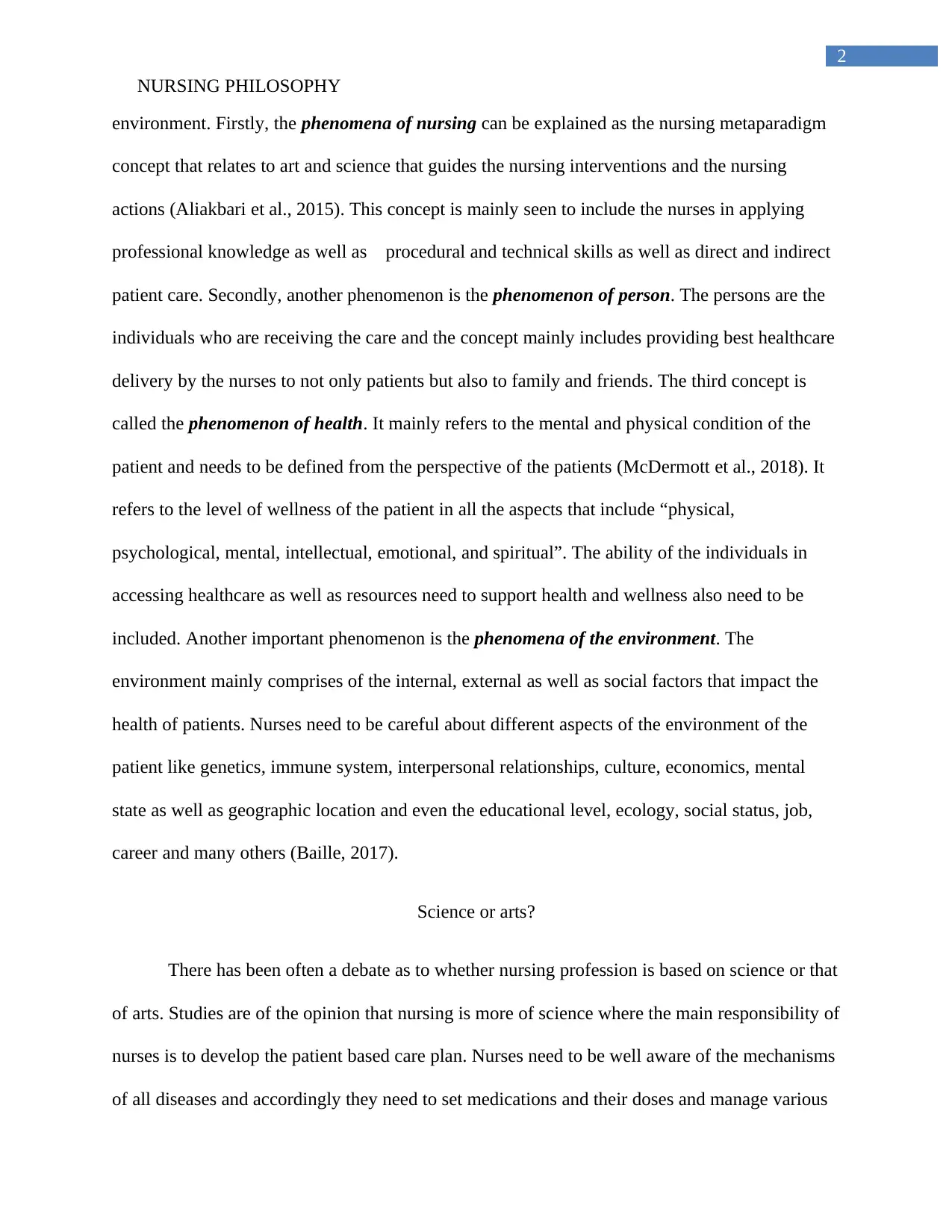
2
NURSING PHILOSOPHY
environment. Firstly, the phenomena of nursing can be explained as the nursing metaparadigm
concept that relates to art and science that guides the nursing interventions and the nursing
actions (Aliakbari et al., 2015). This concept is mainly seen to include the nurses in applying
professional knowledge as well as procedural and technical skills as well as direct and indirect
patient care. Secondly, another phenomenon is the phenomenon of person. The persons are the
individuals who are receiving the care and the concept mainly includes providing best healthcare
delivery by the nurses to not only patients but also to family and friends. The third concept is
called the phenomenon of health. It mainly refers to the mental and physical condition of the
patient and needs to be defined from the perspective of the patients (McDermott et al., 2018). It
refers to the level of wellness of the patient in all the aspects that include “physical,
psychological, mental, intellectual, emotional, and spiritual”. The ability of the individuals in
accessing healthcare as well as resources need to support health and wellness also need to be
included. Another important phenomenon is the phenomena of the environment. The
environment mainly comprises of the internal, external as well as social factors that impact the
health of patients. Nurses need to be careful about different aspects of the environment of the
patient like genetics, immune system, interpersonal relationships, culture, economics, mental
state as well as geographic location and even the educational level, ecology, social status, job,
career and many others (Baille, 2017).
Science or arts?
There has been often a debate as to whether nursing profession is based on science or that
of arts. Studies are of the opinion that nursing is more of science where the main responsibility of
nurses is to develop the patient based care plan. Nurses need to be well aware of the mechanisms
of all diseases and accordingly they need to set medications and their doses and manage various
NURSING PHILOSOPHY
environment. Firstly, the phenomena of nursing can be explained as the nursing metaparadigm
concept that relates to art and science that guides the nursing interventions and the nursing
actions (Aliakbari et al., 2015). This concept is mainly seen to include the nurses in applying
professional knowledge as well as procedural and technical skills as well as direct and indirect
patient care. Secondly, another phenomenon is the phenomenon of person. The persons are the
individuals who are receiving the care and the concept mainly includes providing best healthcare
delivery by the nurses to not only patients but also to family and friends. The third concept is
called the phenomenon of health. It mainly refers to the mental and physical condition of the
patient and needs to be defined from the perspective of the patients (McDermott et al., 2018). It
refers to the level of wellness of the patient in all the aspects that include “physical,
psychological, mental, intellectual, emotional, and spiritual”. The ability of the individuals in
accessing healthcare as well as resources need to support health and wellness also need to be
included. Another important phenomenon is the phenomena of the environment. The
environment mainly comprises of the internal, external as well as social factors that impact the
health of patients. Nurses need to be careful about different aspects of the environment of the
patient like genetics, immune system, interpersonal relationships, culture, economics, mental
state as well as geographic location and even the educational level, ecology, social status, job,
career and many others (Baille, 2017).
Science or arts?
There has been often a debate as to whether nursing profession is based on science or that
of arts. Studies are of the opinion that nursing is more of science where the main responsibility of
nurses is to develop the patient based care plan. Nurses need to be well aware of the mechanisms
of all diseases and accordingly they need to set medications and their doses and manage various
⊘ This is a preview!⊘
Do you want full access?
Subscribe today to unlock all pages.

Trusted by 1+ million students worldwide
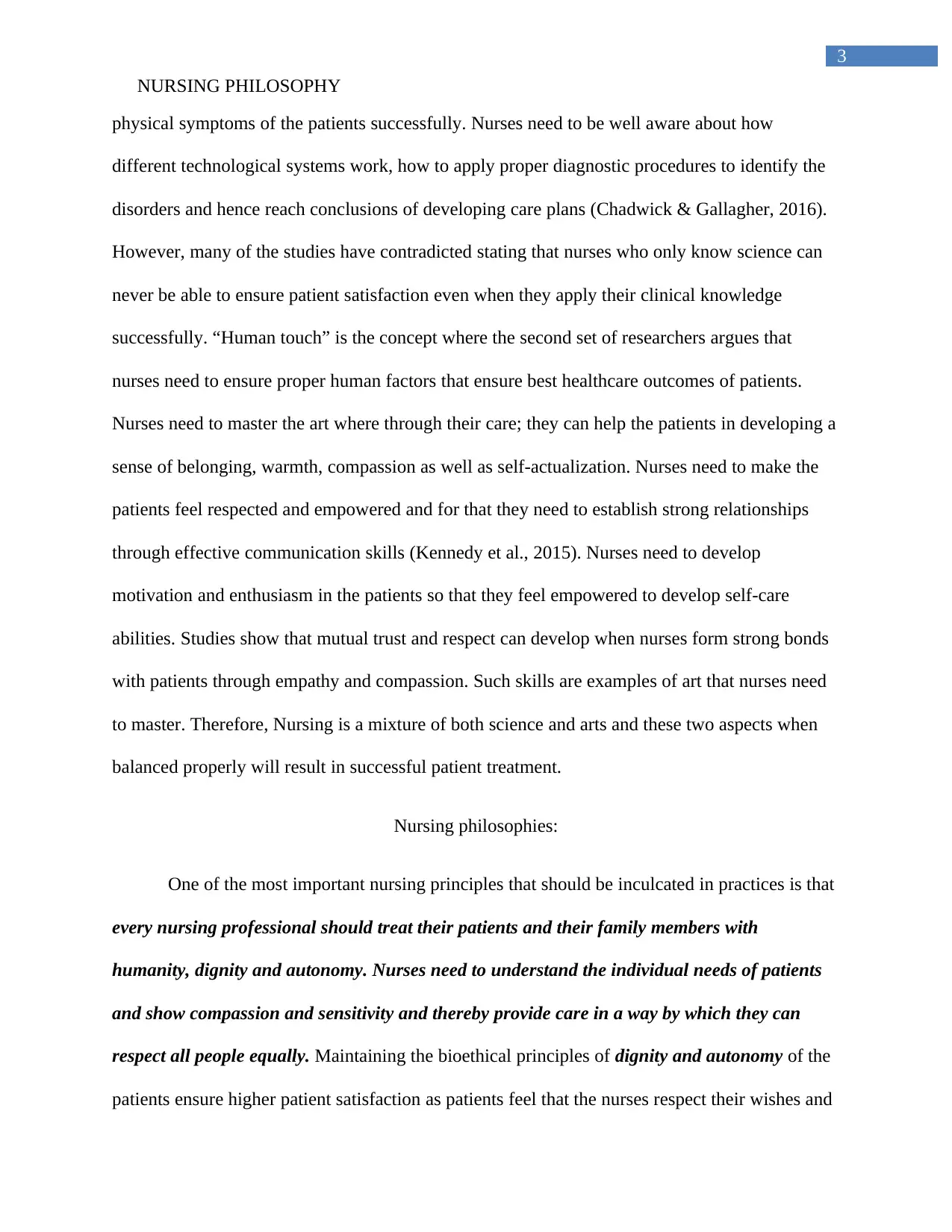
3
NURSING PHILOSOPHY
physical symptoms of the patients successfully. Nurses need to be well aware about how
different technological systems work, how to apply proper diagnostic procedures to identify the
disorders and hence reach conclusions of developing care plans (Chadwick & Gallagher, 2016).
However, many of the studies have contradicted stating that nurses who only know science can
never be able to ensure patient satisfaction even when they apply their clinical knowledge
successfully. “Human touch” is the concept where the second set of researchers argues that
nurses need to ensure proper human factors that ensure best healthcare outcomes of patients.
Nurses need to master the art where through their care; they can help the patients in developing a
sense of belonging, warmth, compassion as well as self-actualization. Nurses need to make the
patients feel respected and empowered and for that they need to establish strong relationships
through effective communication skills (Kennedy et al., 2015). Nurses need to develop
motivation and enthusiasm in the patients so that they feel empowered to develop self-care
abilities. Studies show that mutual trust and respect can develop when nurses form strong bonds
with patients through empathy and compassion. Such skills are examples of art that nurses need
to master. Therefore, Nursing is a mixture of both science and arts and these two aspects when
balanced properly will result in successful patient treatment.
Nursing philosophies:
One of the most important nursing principles that should be inculcated in practices is that
every nursing professional should treat their patients and their family members with
humanity, dignity and autonomy. Nurses need to understand the individual needs of patients
and show compassion and sensitivity and thereby provide care in a way by which they can
respect all people equally. Maintaining the bioethical principles of dignity and autonomy of the
patients ensure higher patient satisfaction as patients feel that the nurses respect their wishes and
NURSING PHILOSOPHY
physical symptoms of the patients successfully. Nurses need to be well aware about how
different technological systems work, how to apply proper diagnostic procedures to identify the
disorders and hence reach conclusions of developing care plans (Chadwick & Gallagher, 2016).
However, many of the studies have contradicted stating that nurses who only know science can
never be able to ensure patient satisfaction even when they apply their clinical knowledge
successfully. “Human touch” is the concept where the second set of researchers argues that
nurses need to ensure proper human factors that ensure best healthcare outcomes of patients.
Nurses need to master the art where through their care; they can help the patients in developing a
sense of belonging, warmth, compassion as well as self-actualization. Nurses need to make the
patients feel respected and empowered and for that they need to establish strong relationships
through effective communication skills (Kennedy et al., 2015). Nurses need to develop
motivation and enthusiasm in the patients so that they feel empowered to develop self-care
abilities. Studies show that mutual trust and respect can develop when nurses form strong bonds
with patients through empathy and compassion. Such skills are examples of art that nurses need
to master. Therefore, Nursing is a mixture of both science and arts and these two aspects when
balanced properly will result in successful patient treatment.
Nursing philosophies:
One of the most important nursing principles that should be inculcated in practices is that
every nursing professional should treat their patients and their family members with
humanity, dignity and autonomy. Nurses need to understand the individual needs of patients
and show compassion and sensitivity and thereby provide care in a way by which they can
respect all people equally. Maintaining the bioethical principles of dignity and autonomy of the
patients ensure higher patient satisfaction as patients feel that the nurses respect their wishes and
Paraphrase This Document
Need a fresh take? Get an instant paraphrase of this document with our AI Paraphraser
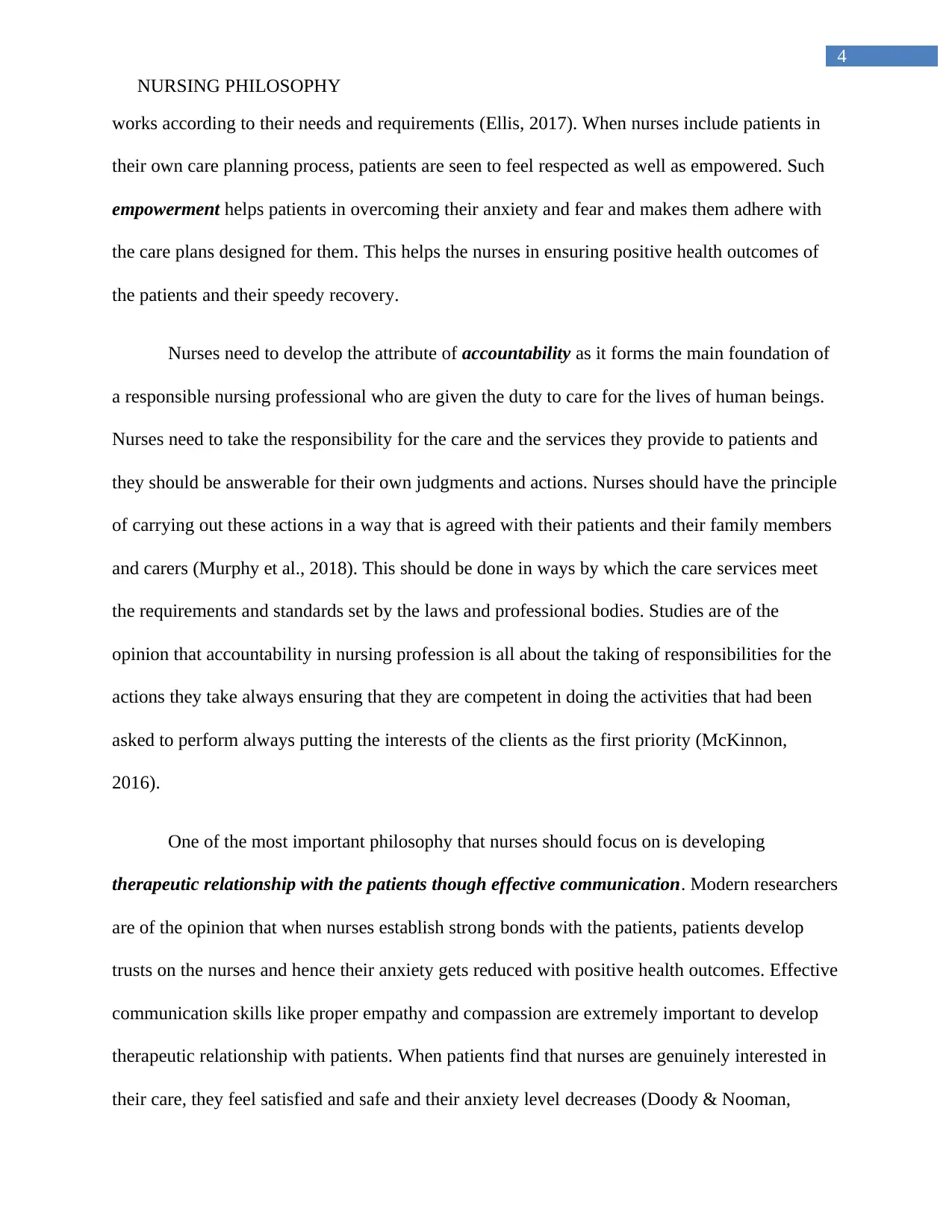
4
NURSING PHILOSOPHY
works according to their needs and requirements (Ellis, 2017). When nurses include patients in
their own care planning process, patients are seen to feel respected as well as empowered. Such
empowerment helps patients in overcoming their anxiety and fear and makes them adhere with
the care plans designed for them. This helps the nurses in ensuring positive health outcomes of
the patients and their speedy recovery.
Nurses need to develop the attribute of accountability as it forms the main foundation of
a responsible nursing professional who are given the duty to care for the lives of human beings.
Nurses need to take the responsibility for the care and the services they provide to patients and
they should be answerable for their own judgments and actions. Nurses should have the principle
of carrying out these actions in a way that is agreed with their patients and their family members
and carers (Murphy et al., 2018). This should be done in ways by which the care services meet
the requirements and standards set by the laws and professional bodies. Studies are of the
opinion that accountability in nursing profession is all about the taking of responsibilities for the
actions they take always ensuring that they are competent in doing the activities that had been
asked to perform always putting the interests of the clients as the first priority (McKinnon,
2016).
One of the most important philosophy that nurses should focus on is developing
therapeutic relationship with the patients though effective communication. Modern researchers
are of the opinion that when nurses establish strong bonds with the patients, patients develop
trusts on the nurses and hence their anxiety gets reduced with positive health outcomes. Effective
communication skills like proper empathy and compassion are extremely important to develop
therapeutic relationship with patients. When patients find that nurses are genuinely interested in
their care, they feel satisfied and safe and their anxiety level decreases (Doody & Nooman,
NURSING PHILOSOPHY
works according to their needs and requirements (Ellis, 2017). When nurses include patients in
their own care planning process, patients are seen to feel respected as well as empowered. Such
empowerment helps patients in overcoming their anxiety and fear and makes them adhere with
the care plans designed for them. This helps the nurses in ensuring positive health outcomes of
the patients and their speedy recovery.
Nurses need to develop the attribute of accountability as it forms the main foundation of
a responsible nursing professional who are given the duty to care for the lives of human beings.
Nurses need to take the responsibility for the care and the services they provide to patients and
they should be answerable for their own judgments and actions. Nurses should have the principle
of carrying out these actions in a way that is agreed with their patients and their family members
and carers (Murphy et al., 2018). This should be done in ways by which the care services meet
the requirements and standards set by the laws and professional bodies. Studies are of the
opinion that accountability in nursing profession is all about the taking of responsibilities for the
actions they take always ensuring that they are competent in doing the activities that had been
asked to perform always putting the interests of the clients as the first priority (McKinnon,
2016).
One of the most important philosophy that nurses should focus on is developing
therapeutic relationship with the patients though effective communication. Modern researchers
are of the opinion that when nurses establish strong bonds with the patients, patients develop
trusts on the nurses and hence their anxiety gets reduced with positive health outcomes. Effective
communication skills like proper empathy and compassion are extremely important to develop
therapeutic relationship with patients. When patients find that nurses are genuinely interested in
their care, they feel satisfied and safe and their anxiety level decreases (Doody & Nooman,
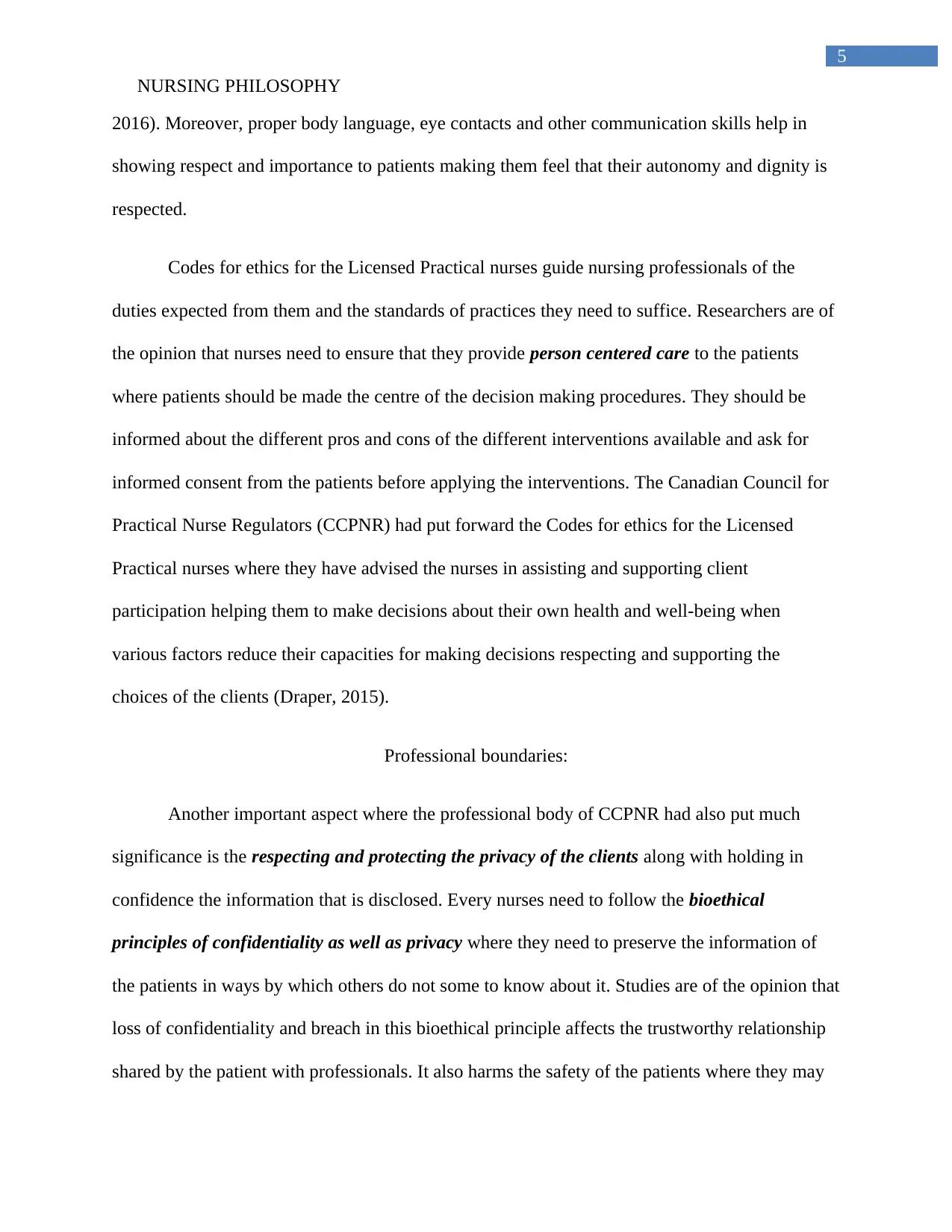
5
NURSING PHILOSOPHY
2016). Moreover, proper body language, eye contacts and other communication skills help in
showing respect and importance to patients making them feel that their autonomy and dignity is
respected.
Codes for ethics for the Licensed Practical nurses guide nursing professionals of the
duties expected from them and the standards of practices they need to suffice. Researchers are of
the opinion that nurses need to ensure that they provide person centered care to the patients
where patients should be made the centre of the decision making procedures. They should be
informed about the different pros and cons of the different interventions available and ask for
informed consent from the patients before applying the interventions. The Canadian Council for
Practical Nurse Regulators (CCPNR) had put forward the Codes for ethics for the Licensed
Practical nurses where they have advised the nurses in assisting and supporting client
participation helping them to make decisions about their own health and well-being when
various factors reduce their capacities for making decisions respecting and supporting the
choices of the clients (Draper, 2015).
Professional boundaries:
Another important aspect where the professional body of CCPNR had also put much
significance is the respecting and protecting the privacy of the clients along with holding in
confidence the information that is disclosed. Every nurses need to follow the bioethical
principles of confidentiality as well as privacy where they need to preserve the information of
the patients in ways by which others do not some to know about it. Studies are of the opinion that
loss of confidentiality and breach in this bioethical principle affects the trustworthy relationship
shared by the patient with professionals. It also harms the safety of the patients where they may
NURSING PHILOSOPHY
2016). Moreover, proper body language, eye contacts and other communication skills help in
showing respect and importance to patients making them feel that their autonomy and dignity is
respected.
Codes for ethics for the Licensed Practical nurses guide nursing professionals of the
duties expected from them and the standards of practices they need to suffice. Researchers are of
the opinion that nurses need to ensure that they provide person centered care to the patients
where patients should be made the centre of the decision making procedures. They should be
informed about the different pros and cons of the different interventions available and ask for
informed consent from the patients before applying the interventions. The Canadian Council for
Practical Nurse Regulators (CCPNR) had put forward the Codes for ethics for the Licensed
Practical nurses where they have advised the nurses in assisting and supporting client
participation helping them to make decisions about their own health and well-being when
various factors reduce their capacities for making decisions respecting and supporting the
choices of the clients (Draper, 2015).
Professional boundaries:
Another important aspect where the professional body of CCPNR had also put much
significance is the respecting and protecting the privacy of the clients along with holding in
confidence the information that is disclosed. Every nurses need to follow the bioethical
principles of confidentiality as well as privacy where they need to preserve the information of
the patients in ways by which others do not some to know about it. Studies are of the opinion that
loss of confidentiality and breach in this bioethical principle affects the trustworthy relationship
shared by the patient with professionals. It also harms the safety of the patients where they may
⊘ This is a preview!⊘
Do you want full access?
Subscribe today to unlock all pages.

Trusted by 1+ million students worldwide
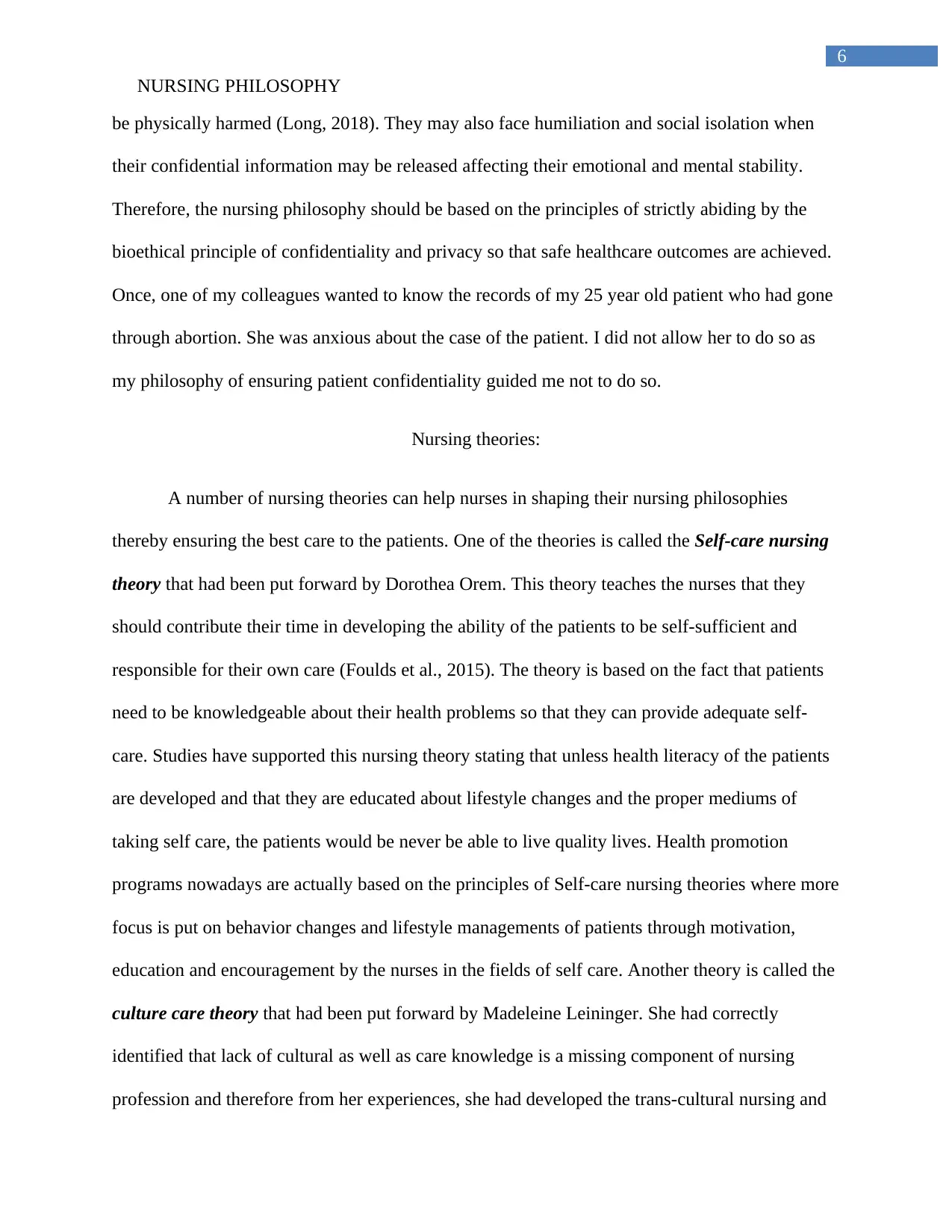
6
NURSING PHILOSOPHY
be physically harmed (Long, 2018). They may also face humiliation and social isolation when
their confidential information may be released affecting their emotional and mental stability.
Therefore, the nursing philosophy should be based on the principles of strictly abiding by the
bioethical principle of confidentiality and privacy so that safe healthcare outcomes are achieved.
Once, one of my colleagues wanted to know the records of my 25 year old patient who had gone
through abortion. She was anxious about the case of the patient. I did not allow her to do so as
my philosophy of ensuring patient confidentiality guided me not to do so.
Nursing theories:
A number of nursing theories can help nurses in shaping their nursing philosophies
thereby ensuring the best care to the patients. One of the theories is called the Self-care nursing
theory that had been put forward by Dorothea Orem. This theory teaches the nurses that they
should contribute their time in developing the ability of the patients to be self-sufficient and
responsible for their own care (Foulds et al., 2015). The theory is based on the fact that patients
need to be knowledgeable about their health problems so that they can provide adequate self-
care. Studies have supported this nursing theory stating that unless health literacy of the patients
are developed and that they are educated about lifestyle changes and the proper mediums of
taking self care, the patients would be never be able to live quality lives. Health promotion
programs nowadays are actually based on the principles of Self-care nursing theories where more
focus is put on behavior changes and lifestyle managements of patients through motivation,
education and encouragement by the nurses in the fields of self care. Another theory is called the
culture care theory that had been put forward by Madeleine Leininger. She had correctly
identified that lack of cultural as well as care knowledge is a missing component of nursing
profession and therefore from her experiences, she had developed the trans-cultural nursing and
NURSING PHILOSOPHY
be physically harmed (Long, 2018). They may also face humiliation and social isolation when
their confidential information may be released affecting their emotional and mental stability.
Therefore, the nursing philosophy should be based on the principles of strictly abiding by the
bioethical principle of confidentiality and privacy so that safe healthcare outcomes are achieved.
Once, one of my colleagues wanted to know the records of my 25 year old patient who had gone
through abortion. She was anxious about the case of the patient. I did not allow her to do so as
my philosophy of ensuring patient confidentiality guided me not to do so.
Nursing theories:
A number of nursing theories can help nurses in shaping their nursing philosophies
thereby ensuring the best care to the patients. One of the theories is called the Self-care nursing
theory that had been put forward by Dorothea Orem. This theory teaches the nurses that they
should contribute their time in developing the ability of the patients to be self-sufficient and
responsible for their own care (Foulds et al., 2015). The theory is based on the fact that patients
need to be knowledgeable about their health problems so that they can provide adequate self-
care. Studies have supported this nursing theory stating that unless health literacy of the patients
are developed and that they are educated about lifestyle changes and the proper mediums of
taking self care, the patients would be never be able to live quality lives. Health promotion
programs nowadays are actually based on the principles of Self-care nursing theories where more
focus is put on behavior changes and lifestyle managements of patients through motivation,
education and encouragement by the nurses in the fields of self care. Another theory is called the
culture care theory that had been put forward by Madeleine Leininger. She had correctly
identified that lack of cultural as well as care knowledge is a missing component of nursing
profession and therefore from her experiences, she had developed the trans-cultural nursing and
Paraphrase This Document
Need a fresh take? Get an instant paraphrase of this document with our AI Paraphraser
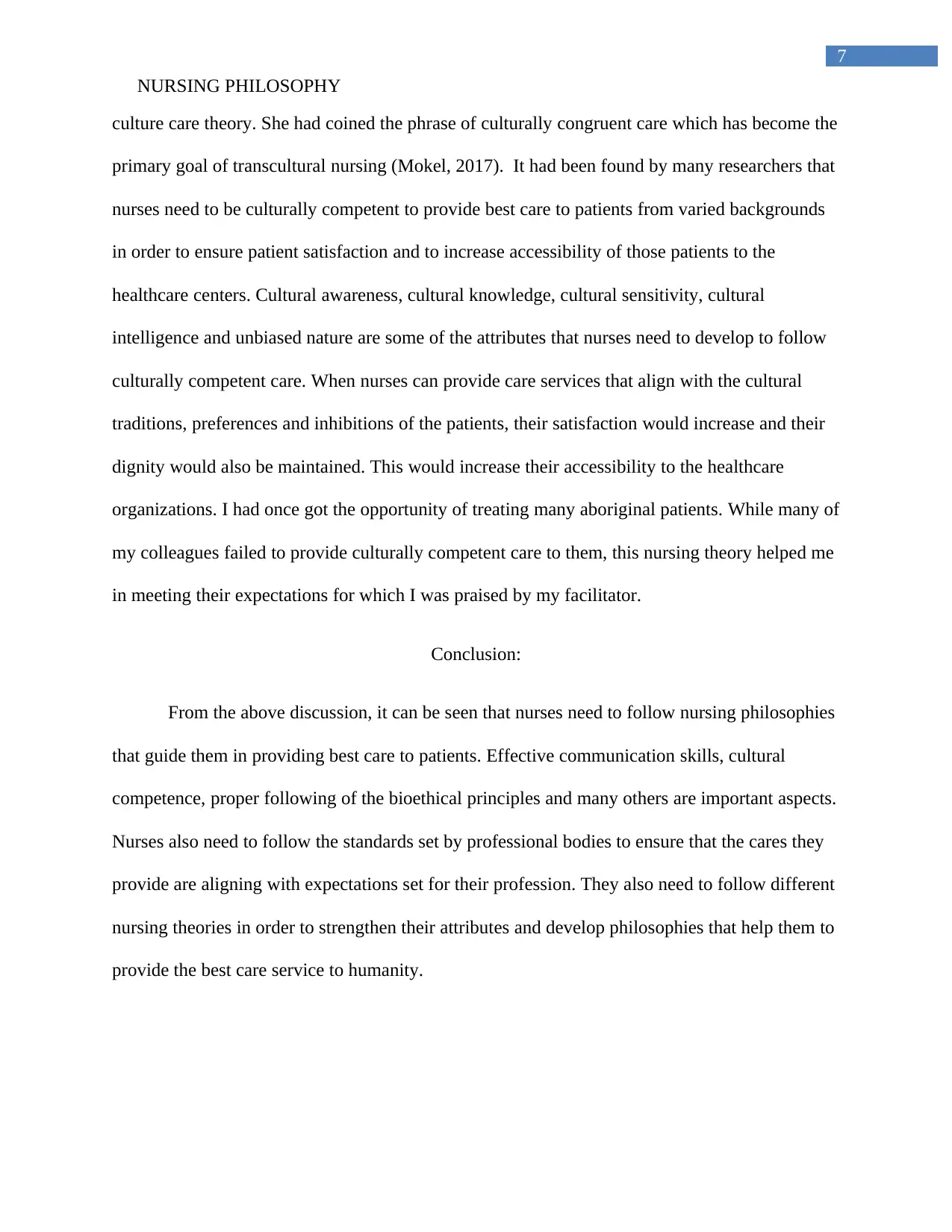
7
NURSING PHILOSOPHY
culture care theory. She had coined the phrase of culturally congruent care which has become the
primary goal of transcultural nursing (Mokel, 2017). It had been found by many researchers that
nurses need to be culturally competent to provide best care to patients from varied backgrounds
in order to ensure patient satisfaction and to increase accessibility of those patients to the
healthcare centers. Cultural awareness, cultural knowledge, cultural sensitivity, cultural
intelligence and unbiased nature are some of the attributes that nurses need to develop to follow
culturally competent care. When nurses can provide care services that align with the cultural
traditions, preferences and inhibitions of the patients, their satisfaction would increase and their
dignity would also be maintained. This would increase their accessibility to the healthcare
organizations. I had once got the opportunity of treating many aboriginal patients. While many of
my colleagues failed to provide culturally competent care to them, this nursing theory helped me
in meeting their expectations for which I was praised by my facilitator.
Conclusion:
From the above discussion, it can be seen that nurses need to follow nursing philosophies
that guide them in providing best care to patients. Effective communication skills, cultural
competence, proper following of the bioethical principles and many others are important aspects.
Nurses also need to follow the standards set by professional bodies to ensure that the cares they
provide are aligning with expectations set for their profession. They also need to follow different
nursing theories in order to strengthen their attributes and develop philosophies that help them to
provide the best care service to humanity.
NURSING PHILOSOPHY
culture care theory. She had coined the phrase of culturally congruent care which has become the
primary goal of transcultural nursing (Mokel, 2017). It had been found by many researchers that
nurses need to be culturally competent to provide best care to patients from varied backgrounds
in order to ensure patient satisfaction and to increase accessibility of those patients to the
healthcare centers. Cultural awareness, cultural knowledge, cultural sensitivity, cultural
intelligence and unbiased nature are some of the attributes that nurses need to develop to follow
culturally competent care. When nurses can provide care services that align with the cultural
traditions, preferences and inhibitions of the patients, their satisfaction would increase and their
dignity would also be maintained. This would increase their accessibility to the healthcare
organizations. I had once got the opportunity of treating many aboriginal patients. While many of
my colleagues failed to provide culturally competent care to them, this nursing theory helped me
in meeting their expectations for which I was praised by my facilitator.
Conclusion:
From the above discussion, it can be seen that nurses need to follow nursing philosophies
that guide them in providing best care to patients. Effective communication skills, cultural
competence, proper following of the bioethical principles and many others are important aspects.
Nurses also need to follow the standards set by professional bodies to ensure that the cares they
provide are aligning with expectations set for their profession. They also need to follow different
nursing theories in order to strengthen their attributes and develop philosophies that help them to
provide the best care service to humanity.
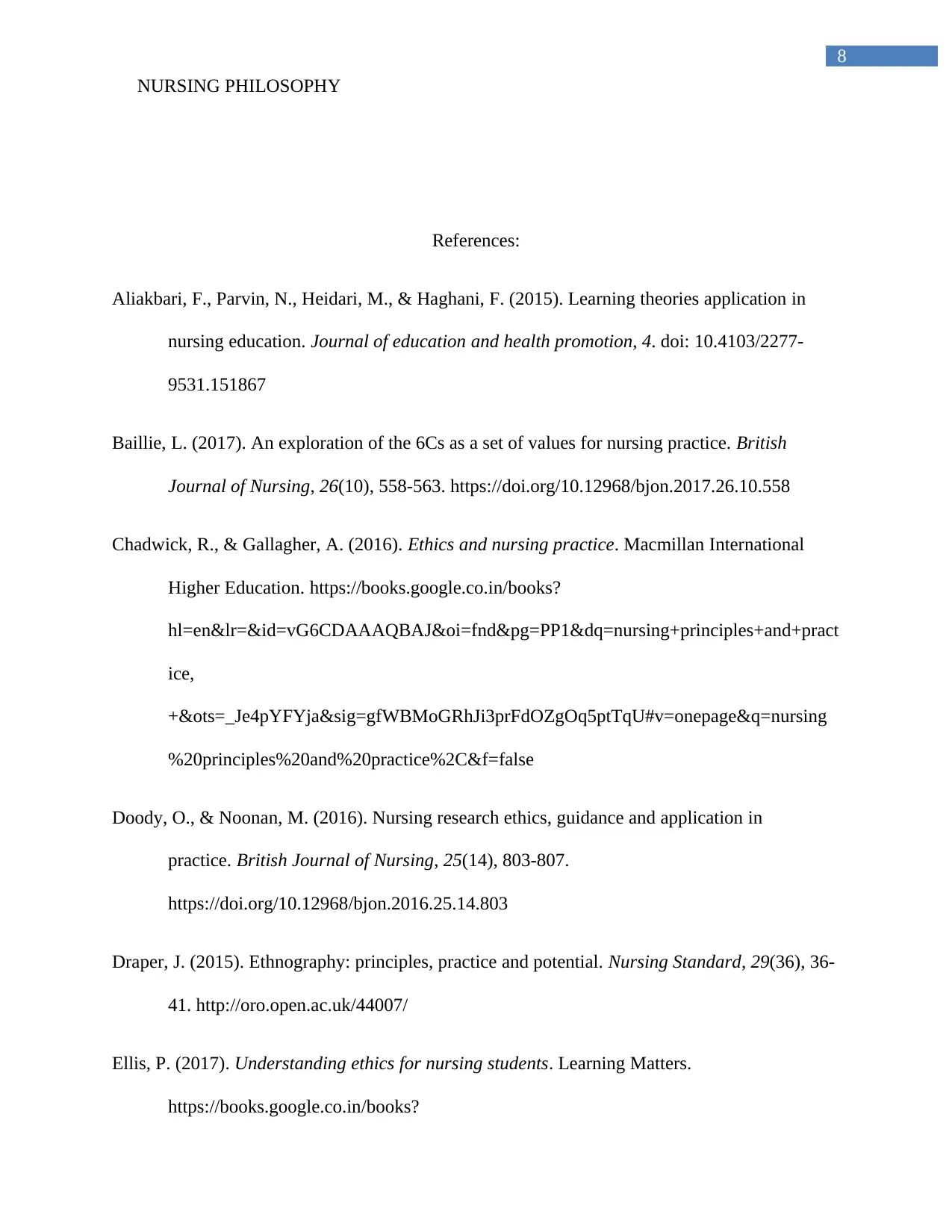
8
NURSING PHILOSOPHY
References:
Aliakbari, F., Parvin, N., Heidari, M., & Haghani, F. (2015). Learning theories application in
nursing education. Journal of education and health promotion, 4. doi: 10.4103/2277-
9531.151867
Baillie, L. (2017). An exploration of the 6Cs as a set of values for nursing practice. British
Journal of Nursing, 26(10), 558-563. https://doi.org/10.12968/bjon.2017.26.10.558
Chadwick, R., & Gallagher, A. (2016). Ethics and nursing practice. Macmillan International
Higher Education. https://books.google.co.in/books?
hl=en&lr=&id=vG6CDAAAQBAJ&oi=fnd&pg=PP1&dq=nursing+principles+and+pract
ice,
+&ots=_Je4pYFYja&sig=gfWBMoGRhJi3prFdOZgOq5ptTqU#v=onepage&q=nursing
%20principles%20and%20practice%2C&f=false
Doody, O., & Noonan, M. (2016). Nursing research ethics, guidance and application in
practice. British Journal of Nursing, 25(14), 803-807.
https://doi.org/10.12968/bjon.2016.25.14.803
Draper, J. (2015). Ethnography: principles, practice and potential. Nursing Standard, 29(36), 36-
41. http://oro.open.ac.uk/44007/
Ellis, P. (2017). Understanding ethics for nursing students. Learning Matters.
https://books.google.co.in/books?
NURSING PHILOSOPHY
References:
Aliakbari, F., Parvin, N., Heidari, M., & Haghani, F. (2015). Learning theories application in
nursing education. Journal of education and health promotion, 4. doi: 10.4103/2277-
9531.151867
Baillie, L. (2017). An exploration of the 6Cs as a set of values for nursing practice. British
Journal of Nursing, 26(10), 558-563. https://doi.org/10.12968/bjon.2017.26.10.558
Chadwick, R., & Gallagher, A. (2016). Ethics and nursing practice. Macmillan International
Higher Education. https://books.google.co.in/books?
hl=en&lr=&id=vG6CDAAAQBAJ&oi=fnd&pg=PP1&dq=nursing+principles+and+pract
ice,
+&ots=_Je4pYFYja&sig=gfWBMoGRhJi3prFdOZgOq5ptTqU#v=onepage&q=nursing
%20principles%20and%20practice%2C&f=false
Doody, O., & Noonan, M. (2016). Nursing research ethics, guidance and application in
practice. British Journal of Nursing, 25(14), 803-807.
https://doi.org/10.12968/bjon.2016.25.14.803
Draper, J. (2015). Ethnography: principles, practice and potential. Nursing Standard, 29(36), 36-
41. http://oro.open.ac.uk/44007/
Ellis, P. (2017). Understanding ethics for nursing students. Learning Matters.
https://books.google.co.in/books?
⊘ This is a preview!⊘
Do you want full access?
Subscribe today to unlock all pages.

Trusted by 1+ million students worldwide
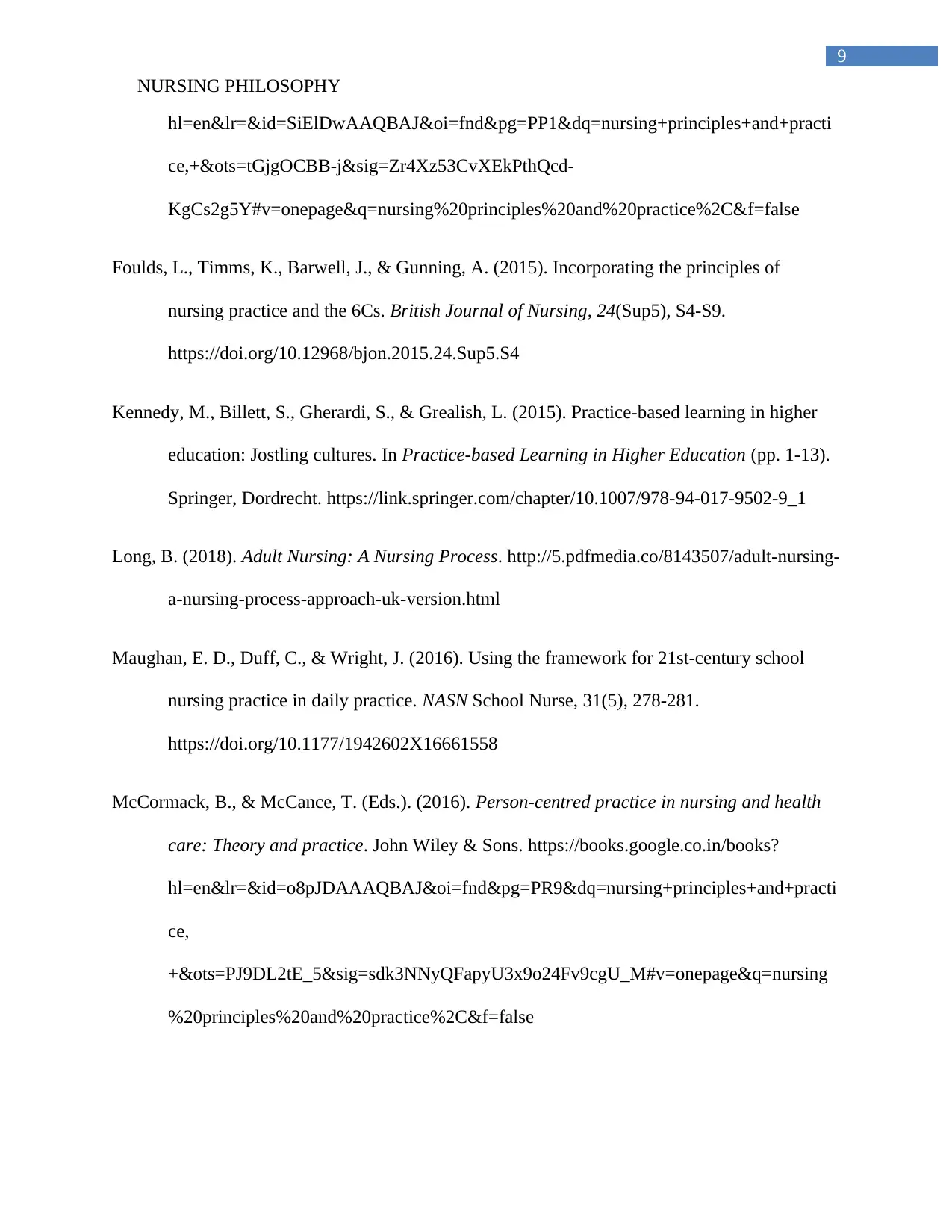
9
NURSING PHILOSOPHY
hl=en&lr=&id=SiElDwAAQBAJ&oi=fnd&pg=PP1&dq=nursing+principles+and+practi
ce,+&ots=tGjgOCBB-j&sig=Zr4Xz53CvXEkPthQcd-
KgCs2g5Y#v=onepage&q=nursing%20principles%20and%20practice%2C&f=false
Foulds, L., Timms, K., Barwell, J., & Gunning, A. (2015). Incorporating the principles of
nursing practice and the 6Cs. British Journal of Nursing, 24(Sup5), S4-S9.
https://doi.org/10.12968/bjon.2015.24.Sup5.S4
Kennedy, M., Billett, S., Gherardi, S., & Grealish, L. (2015). Practice-based learning in higher
education: Jostling cultures. In Practice-based Learning in Higher Education (pp. 1-13).
Springer, Dordrecht. https://link.springer.com/chapter/10.1007/978-94-017-9502-9_1
Long, B. (2018). Adult Nursing: A Nursing Process. http://5.pdfmedia.co/8143507/adult-nursing-
a-nursing-process-approach-uk-version.html
Maughan, E. D., Duff, C., & Wright, J. (2016). Using the framework for 21st-century school
nursing practice in daily practice. NASN School Nurse, 31(5), 278-281.
https://doi.org/10.1177/1942602X16661558
McCormack, B., & McCance, T. (Eds.). (2016). Person-centred practice in nursing and health
care: Theory and practice. John Wiley & Sons. https://books.google.co.in/books?
hl=en&lr=&id=o8pJDAAAQBAJ&oi=fnd&pg=PR9&dq=nursing+principles+and+practi
ce,
+&ots=PJ9DL2tE_5&sig=sdk3NNyQFapyU3x9o24Fv9cgU_M#v=onepage&q=nursing
%20principles%20and%20practice%2C&f=false
NURSING PHILOSOPHY
hl=en&lr=&id=SiElDwAAQBAJ&oi=fnd&pg=PP1&dq=nursing+principles+and+practi
ce,+&ots=tGjgOCBB-j&sig=Zr4Xz53CvXEkPthQcd-
KgCs2g5Y#v=onepage&q=nursing%20principles%20and%20practice%2C&f=false
Foulds, L., Timms, K., Barwell, J., & Gunning, A. (2015). Incorporating the principles of
nursing practice and the 6Cs. British Journal of Nursing, 24(Sup5), S4-S9.
https://doi.org/10.12968/bjon.2015.24.Sup5.S4
Kennedy, M., Billett, S., Gherardi, S., & Grealish, L. (2015). Practice-based learning in higher
education: Jostling cultures. In Practice-based Learning in Higher Education (pp. 1-13).
Springer, Dordrecht. https://link.springer.com/chapter/10.1007/978-94-017-9502-9_1
Long, B. (2018). Adult Nursing: A Nursing Process. http://5.pdfmedia.co/8143507/adult-nursing-
a-nursing-process-approach-uk-version.html
Maughan, E. D., Duff, C., & Wright, J. (2016). Using the framework for 21st-century school
nursing practice in daily practice. NASN School Nurse, 31(5), 278-281.
https://doi.org/10.1177/1942602X16661558
McCormack, B., & McCance, T. (Eds.). (2016). Person-centred practice in nursing and health
care: Theory and practice. John Wiley & Sons. https://books.google.co.in/books?
hl=en&lr=&id=o8pJDAAAQBAJ&oi=fnd&pg=PR9&dq=nursing+principles+and+practi
ce,
+&ots=PJ9DL2tE_5&sig=sdk3NNyQFapyU3x9o24Fv9cgU_M#v=onepage&q=nursing
%20principles%20and%20practice%2C&f=false
Paraphrase This Document
Need a fresh take? Get an instant paraphrase of this document with our AI Paraphraser
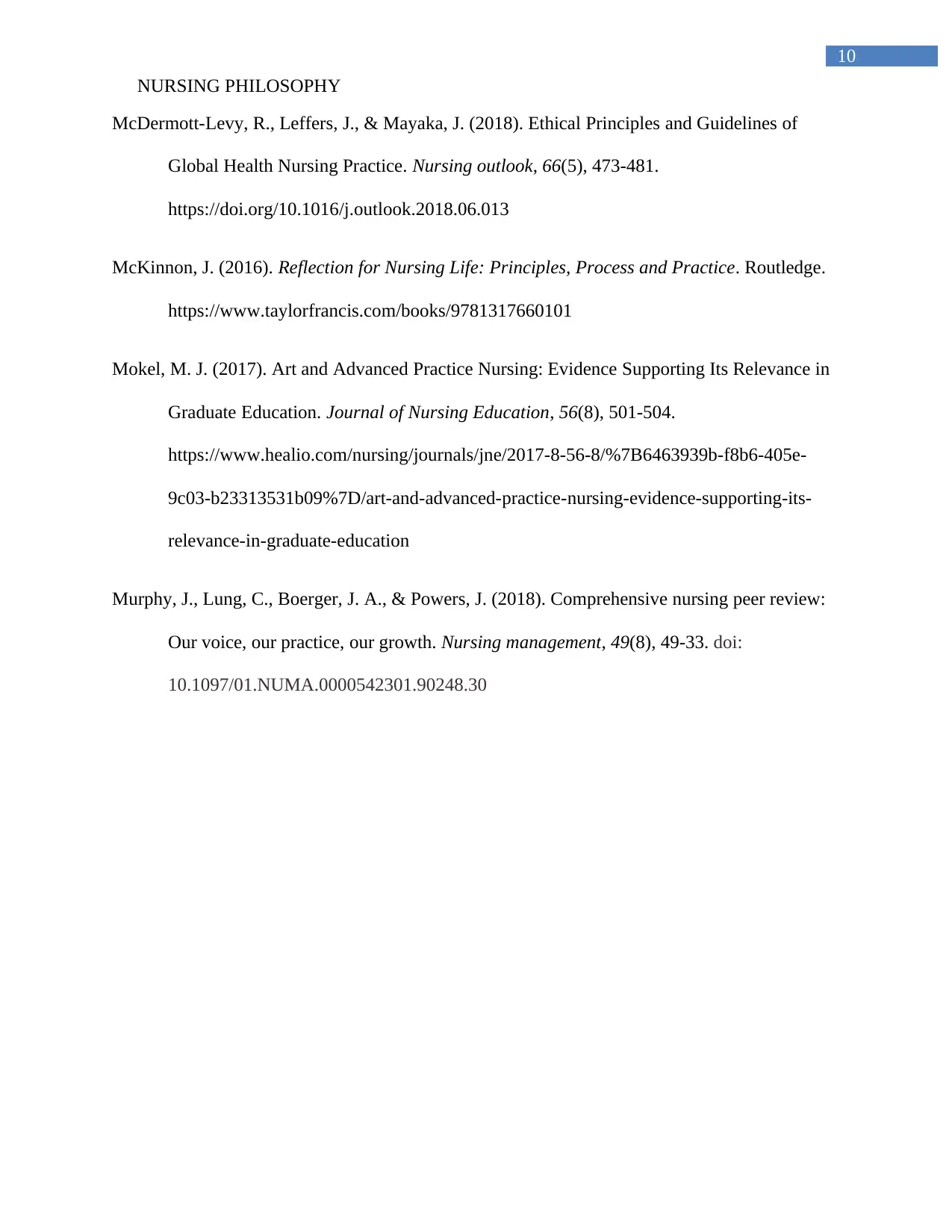
10
NURSING PHILOSOPHY
McDermott-Levy, R., Leffers, J., & Mayaka, J. (2018). Ethical Principles and Guidelines of
Global Health Nursing Practice. Nursing outlook, 66(5), 473-481.
https://doi.org/10.1016/j.outlook.2018.06.013
McKinnon, J. (2016). Reflection for Nursing Life: Principles, Process and Practice. Routledge.
https://www.taylorfrancis.com/books/9781317660101
Mokel, M. J. (2017). Art and Advanced Practice Nursing: Evidence Supporting Its Relevance in
Graduate Education. Journal of Nursing Education, 56(8), 501-504.
https://www.healio.com/nursing/journals/jne/2017-8-56-8/%7B6463939b-f8b6-405e-
9c03-b23313531b09%7D/art-and-advanced-practice-nursing-evidence-supporting-its-
relevance-in-graduate-education
Murphy, J., Lung, C., Boerger, J. A., & Powers, J. (2018). Comprehensive nursing peer review:
Our voice, our practice, our growth. Nursing management, 49(8), 49-33. doi:
10.1097/01.NUMA.0000542301.90248.30
NURSING PHILOSOPHY
McDermott-Levy, R., Leffers, J., & Mayaka, J. (2018). Ethical Principles and Guidelines of
Global Health Nursing Practice. Nursing outlook, 66(5), 473-481.
https://doi.org/10.1016/j.outlook.2018.06.013
McKinnon, J. (2016). Reflection for Nursing Life: Principles, Process and Practice. Routledge.
https://www.taylorfrancis.com/books/9781317660101
Mokel, M. J. (2017). Art and Advanced Practice Nursing: Evidence Supporting Its Relevance in
Graduate Education. Journal of Nursing Education, 56(8), 501-504.
https://www.healio.com/nursing/journals/jne/2017-8-56-8/%7B6463939b-f8b6-405e-
9c03-b23313531b09%7D/art-and-advanced-practice-nursing-evidence-supporting-its-
relevance-in-graduate-education
Murphy, J., Lung, C., Boerger, J. A., & Powers, J. (2018). Comprehensive nursing peer review:
Our voice, our practice, our growth. Nursing management, 49(8), 49-33. doi:
10.1097/01.NUMA.0000542301.90248.30
1 out of 11
Related Documents
Your All-in-One AI-Powered Toolkit for Academic Success.
+13062052269
info@desklib.com
Available 24*7 on WhatsApp / Email
![[object Object]](/_next/static/media/star-bottom.7253800d.svg)
Unlock your academic potential
Copyright © 2020–2026 A2Z Services. All Rights Reserved. Developed and managed by ZUCOL.





